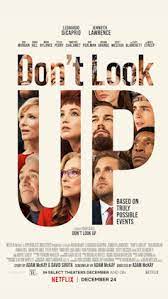
© Netflix / Hyperobject Industries
Before I start, a warning – many spoilers ahead!
Appropriately for a year that was fairly grim, the final movie I watched in 2021 was the recently released, apocalyptic sci-fi satire Don’t Look Up, which tells the story of how two astronomers (Leonardo DiCaprio and Jennifer Lawrence) discover a comet hurtling on a course that in six months’ time will bring it smashing into the earth and wiping out all life here. But their warnings about what’s coming are muffled by a trivia-obsessed media, chiefly represented by fatuous talk show hosts Cate Blanchett and Tyler Perry, which refuses to take them seriously. They’re also thwarted by duplicitous politicians, most notably Meryl Streep as the American president, who are reluctant to take decisive action and blow the damned comet out of the sky because, it transpires, it’s loaded with priceless minerals.
Don’t Look Up is interesting in that while it enjoys a healthy 7.3 / 10 approval rating from users of the online film database IMDb, and an even healthier ’82% liked this film’ rating among Google users, the reviews by film critics have been less enthusiastic – approval ratings of 54% and 50% on the critical aggregates Rotten Tomatoes and Metacritic respectively. Among those unimpressed critics were the Guardian’s Peter Bradshaw, who called it ‘laboured, self-conscious and unrelaxed’, and Rolling Stone’s David Fear, who described it as ‘a righteous two-hour lecture masquerading as a satire’. Meanwhile, in the Independent, Louis Chilton went the whole hog and penned an article entitled WHAT GOES UP, MUST COME DOWN: WHY IT’S OKAY TO HATE ‘DON’T LOOK UP’. In this, he opined, “the execution is too broad and condescending… And for a comedy, perhaps its greatest offence is that there are almost no laughs.”
So Don’t Look Up has received contrasting levels of appreciation from ordinary viewers and from the critics. Interestingly, one faction that’s whole-heartedly praised the film has been environmental journalists and scientists. Climate scientist Peter Kalmus wrote in the Guardian that as someone “doing everything I can to wake people up and avoid planetary destruction, it’s also the most accurate film about society’s terrifying non-response to climate breakdown I’ve seen.” Meanwhile, in the Guardian too, environmental journalist George Monbiot declared, “The movie is, in my view, a powerful demolition of the grotesque failures of public life. And the sector whose failures are most brutally exposed is the media… it seemed all too real. I felt as if I were watching my adult life flash past me. As the scientists in the film, trying to draw attention to the approach of a planet-killing comet, bashed their heads against the Great Wall of Denial erected by the media and sought to reach politicians with 10-second attention spans, all the anger and frustration and desperation I’ve felt over the years boiled over.”
Well, I have to say I come down on the side of Joe Public (and the environmentalists) and not on the side of the critics who, as part of the mainstream media, were perhaps not best pleased by how the film portrayed that media. I liked Don’t Look Up and, despite what Louis Chilton claimed in the Independent, enjoyed several hearty laughs during its running time. There are a few problems, which I’ll talk about in a minute, but generally I’m happy to give the movie the thumbs up.

© Netflix / Hyperobject Industries
Much of what works in the movie is due to its impeccable cast. DiCaprio and Lawrence make a good double-act as the astronomers. DiCaprio is a timid character, at times a bundle of nerves, cerebral but inarticulate when he comes under pressure. Lawrence is the opposite, ready to forcibly speak her mind when she sees others obfuscating. As events unfurl, it’s the bumbling DiCaprio who unwittingly becomes a media star, probably because he matches public perceptions of what scientists should be like – cuddly, eccentric Albert Einstein types. Meanwhile, the abrasive Lawrence is banished from the limelight. DiCaprio plays along with this and ingratiates himself with the media and political establishments, believing he can exert a positive influence over the people in power who are dealing with the comet. He can’t, as it turns out, and while he compromises his principles his private life up-ends and he becomes estranged from his wife and children.
Perry and Blanchett are simultaneously amusing and chilling as the shallow talk-show hosts, though Blanchett is allowed a sliver of character development later when we learn she has three master’s degrees, meaning that her lack of acumen onscreen is merely an audience-pleasing act. The sequence where DiCaprio and Lawrence go on their show, The Daily Rip, to break the bad news about the comet to the world, and find the hosts more interested in interviewing a pop-poppet (played by Ariane Grande, no less) about her split with her pop-poppet boyfriend, is a masterclass in cringe comedy worthy of Ricky Gervais or Armando Iannucci.
Meryl Streep, meanwhile, is majestically horrible as the president. It would have been easy to portray her as a female Trump, but she’s smarter and smoother than the blustering, orange-skinned, cunning-without-being-smart property tycoon. “I say we sit tight and assess,” is her initial reaction to DiCaprio and Lawrence’s warnings, which she justifies with the observation, “You cannot go around saying to people that there’s 100% chance that they’re going to die. You know? It’s just nuts!” When she’s faced with a potentially explosive scandal and needs something to divert the media’s attention, however, she changes her tune. She suddenly plays up the comet and amid much patriotic hoopla marshals the US’s nuclear firepower in an effort to annihilate it before it reaches the earth. Her tune changes again when a major donor to her party persuades her to cancel the plan to destroy the comet, because it’s a goldmine of precious metals, and proposes a different way of handling it.
The donor is a Silicon Valley billionaire played by Mark Rylance, who believes his company has the capability to send a fleet of rocket-powered robots to the comet and seed it with explosives. These will break it into small, non-cataclysmic fragments that can be retrieved and put to lucrative use when they fall to earth. Stiff, eternally smiling, generally weird, Rylance comes across as a creepy mixture of Elon Musk, Andy Warhol and Michael Jackson. Incidentally, the character’s fondness for having children onstage with him when he’s unveiling his company’s latest high-tech gadgets reminded me faintly of Jackson’s disastrous performance of The Earth Song at the 1996 Brit Awards in London, when he had a crowd of child actors in tow. Rylance leaves you wondering if the character is a genius or just some arrested-development man-child who’s been extraordinarily lucky. Due to his wealth, of course, the establishment believe he is a genius and happily go along with his comet-breaking scheme. You can guess how it ends.

© Netflix / Hyperobject Industries
The best performance, though, comes from Jonah Hill as the White House Chief of Staff, who also happens to be President Streep’s son. If writer-director-producer Adam McKay doesn’t satirise Donald Trump directly with Streep, he certainly skewers the Trump White House with Hill’s character, a smug, obnoxious, entitled arse with all the characteristics of the promoted-beyond-their-abilities Trump kids (and Jared Kushner). Hill makes a meal of the role. “You’re breathing weird. It’s making me uncomfortable,” he whines at DiCaprio when the latter gets worked up describing the mile-high tsunamis that’ll crash across the planet when the comet hits. And when DiCaprio tells him the chance of this happening is ’99.78 percent’, he reacts, “Oh, great! So it’s not 100 percent.” McKay also uses the character to take a swipe at Trumpism’s biggest coup, that of convincing masses of ordinary, often hard-up people to support a wealthy, right-wing elite by demonising another part of America, the part that’s liberal, urban and educated. We hear Hill declare at a rally: “There’s three types of American people. There are you, the working class. Us, the cool rich. And then them!”
On the minus side, I’d say Don’t Look Up is about half-an-hour too long. Its unnecessary length means the satire gets a bit samey and the jokes get stretched a bit thin towards the end. Also, late on, there are jarring tonal shifts. We have solemn moments where DiCaprio tries to make peace with his loved ones and enjoy some final, life-affirming time with them, even while the gigantic tsunamis surge out from the comet’s strike-point. This put me in mind of another movie about a collision of celestial bodies, Lars Von Trier’s Melancholia (2011), even though for the most part it’s a million miles removed from Don’t Look Up in mood. However, intercut with the DiCaprio scenes are ones where the satire continues, with Streep, Rylance and a super-rich select few escaping from the earth, in suspended animation, on board a specially-prepared spaceship, which’ll take them to another earth-type planet 23,000 years from now. While I enjoyed both sub-plots, having them unwind side-by-side made me feel I was watching two different films.
Also, for a movie that’s about the disparagement of science, Don’t Look Up could have been more scientifically accurate in places. The initial operation to completely destroy the comet involves sending an astronaut (Ron Perlman) up into space on a suicide mission. He’s in a recommissioned space shuttle and shepherding a flock of rockets carrying nuclear bombs, all on a collision course with the comet. But the real space shuttle could never get beyond a low-earth orbit because it couldn’t carry enough propellant to go further. How is Perlman going to reach the comet, which is still a few months away at this point? Couldn’t they just launch the rockets, without the shuttle, and guide them from the ground? The ‘sleeper’ spaceship that appears at the end and transports a lucky few to a planet in a faraway solar system sets up a good final gag, but it troubled me too. If the elite, which includes Rylance’s character, have the technology at their disposal to create a spaceship like that – officially, manned interstellar space travel and suspended animation are beyond human know-how at the moment – couldn’t Rylance have put that fabulous technology to more immediate use and made a better job of his comet-breaking operation?
Although people have interpreted Don’t Look Up’s comet as a metaphor for climate change and society’s hopeless attempts, or non-attempts, to address it, I think the film is making broader comments about the scientific community, the media, politicians and their responses to crises generally. It’s not as if the politicians spend the whole film denying the existence of the comet, as some real-life ones still deny that climate change is happening. Fairly early on, it’s established that, yes, the comet is heading our way (although we see instances of ‘comet-deniers’ among the general public later on). It’s more about how self-interest and opportunism get in the way of necessary and meaningful action.
When Streep gives Rylance’s daft plan to harvest the comet the go-ahead, I found myself thinking of a real-life, down-to-earth and non-American parallel. During the Covid-19 pandemic in Britain, Boris Johnson’s Conservative government frequently handed out lucrative contracts for making personal protective equipment (PPE), establishing tracing programmes, setting up testing centres and so on to private companies that lacked medical experience, but were sympathetic to or connected with the Conservative party. Often, the results were disastrous. But hey, if you have access to power and can make a fast buck during a catastrophe, why not?
So actually, you don’t have to look up. Just look around you instead. It’s happening everywhere, this moment.

© Netflix / Hyperobject Industries
